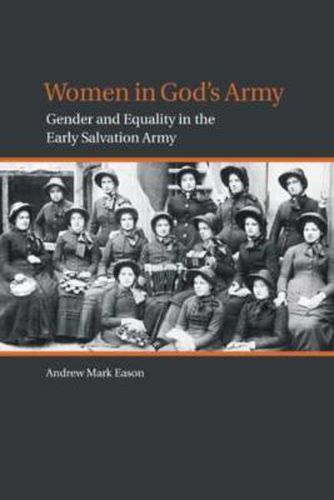Readings Newsletter
Become a Readings Member to make your shopping experience even easier.
Sign in or sign up for free!
You’re not far away from qualifying for FREE standard shipping within Australia
You’ve qualified for FREE standard shipping within Australia
The cart is loading…






Women in God’s Army is the first study of its kind devoted to the critical analysis of this central claim. It traces the extent to which this egalitarian ideal was realised in the private and public lives of first- and second-generation female Salvationists in Britain and argues that the Salvation Army was found wanting in its overall commitment to women’s equality with men. Bold pronouncements were not matched by actual practice in the home or in public ministry. Andrew Mark Eason traces the nature of these discrepancies, as well as the Victorian and evangelical factors that lay behind them. He demonstrates how Salvationists often assigned roles and responsibilities on the basis of gender rather than equality, and the ways in which these discriminatory practices were supported by a male-defined theology and authority. He views this story from a number of angles, including historical, gender and feminist theology, ensuring it will be of interest to a wide spectrum of readers. Salvationists themselves will appreciate the light it sheds on recent debates. Ultimately, however, anyone who wants to learn more about the human struggle for equality will find this book enlightening.
$9.00 standard shipping within Australia
FREE standard shipping within Australia for orders over $100.00
Express & International shipping calculated at checkout
Women in God’s Army is the first study of its kind devoted to the critical analysis of this central claim. It traces the extent to which this egalitarian ideal was realised in the private and public lives of first- and second-generation female Salvationists in Britain and argues that the Salvation Army was found wanting in its overall commitment to women’s equality with men. Bold pronouncements were not matched by actual practice in the home or in public ministry. Andrew Mark Eason traces the nature of these discrepancies, as well as the Victorian and evangelical factors that lay behind them. He demonstrates how Salvationists often assigned roles and responsibilities on the basis of gender rather than equality, and the ways in which these discriminatory practices were supported by a male-defined theology and authority. He views this story from a number of angles, including historical, gender and feminist theology, ensuring it will be of interest to a wide spectrum of readers. Salvationists themselves will appreciate the light it sheds on recent debates. Ultimately, however, anyone who wants to learn more about the human struggle for equality will find this book enlightening.